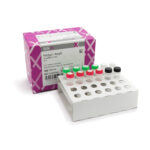KIR genes
Killer-cell Immunoglobulin-like Receptor (KIR) genes, (KIR) are a family of genes that encode cell surface receptors found on natural killer (NK) cells and some subsets of T cells. These receptors play a crucial role in the regulation of immune responses.
NK cells are a type of lymphocyte that can recognize and eliminate infected or abnormal cells, such as virus-infected cells or tumor cells. The KIR receptors on NK cells bind to specific molecules called human leukocyte antigen (HLA) class I, which are found on the surface of nearly all nucleated cells in the body. This interaction between KIR receptors and HLA class I molecules helps NK cells distinguish between healthy cells and abnormal cells.
There are several different KIR genes, and individuals can have different combinations and variations of these genes, leading to diverse KIR genotypes. The presence or absence of specific KIR genes, as well as the interaction between KIR receptors and HLA class I molecules, can influence the activity and function of NK cells, affecting immune responses and susceptibility to various diseases.
KIR typing and role in disease
KIR gene typing involves determining the presence or absence of specific KIR genes in an individual’s genome. This information helps researchers and healthcare professionals understand the genetic variations and diversity of KIR genes within populations and how they may influence immune responses and disease susceptibility.
There are various techniques used for KIR gene typing, including polymerase chain reaction (PCR), sequence-specific oligonucleotide probes (SSOP), and next-generation sequencing (NGS) methods. These methods can identify specific KIR genes and their variants, as well as determine the genotypes and haplotypes of KIR gene combinations.
KIR gene typing is often performed in research studies to investigate the association between KIR genes and diseases, such as autoimmune disorders, infectious diseases, and cancer. It can also be used in clinical settings to assess the compatibility of KIR genes between donors and recipients in hematopoietic stem cell transplantation (HSCT), as the compatibility of KIR genes can affect the success of the transplantation.


